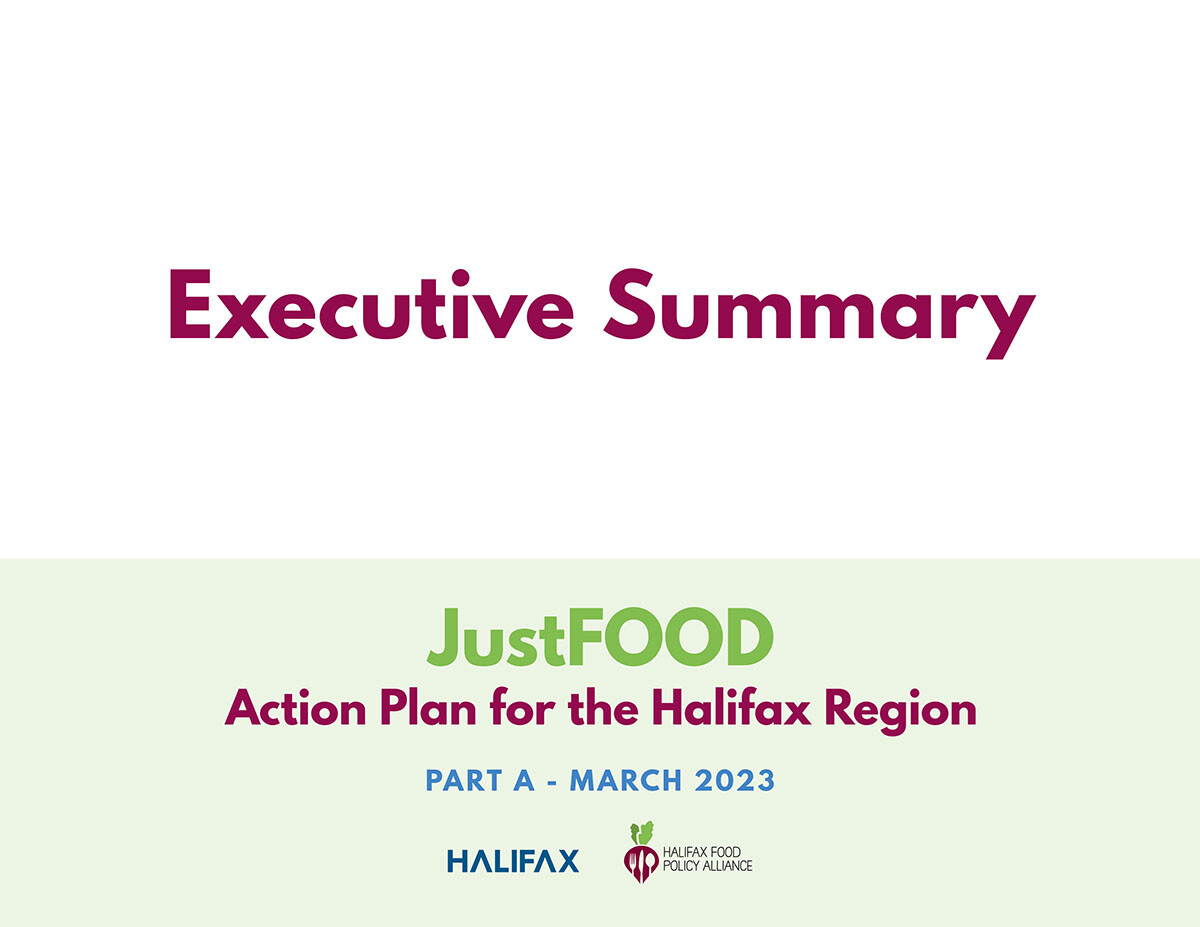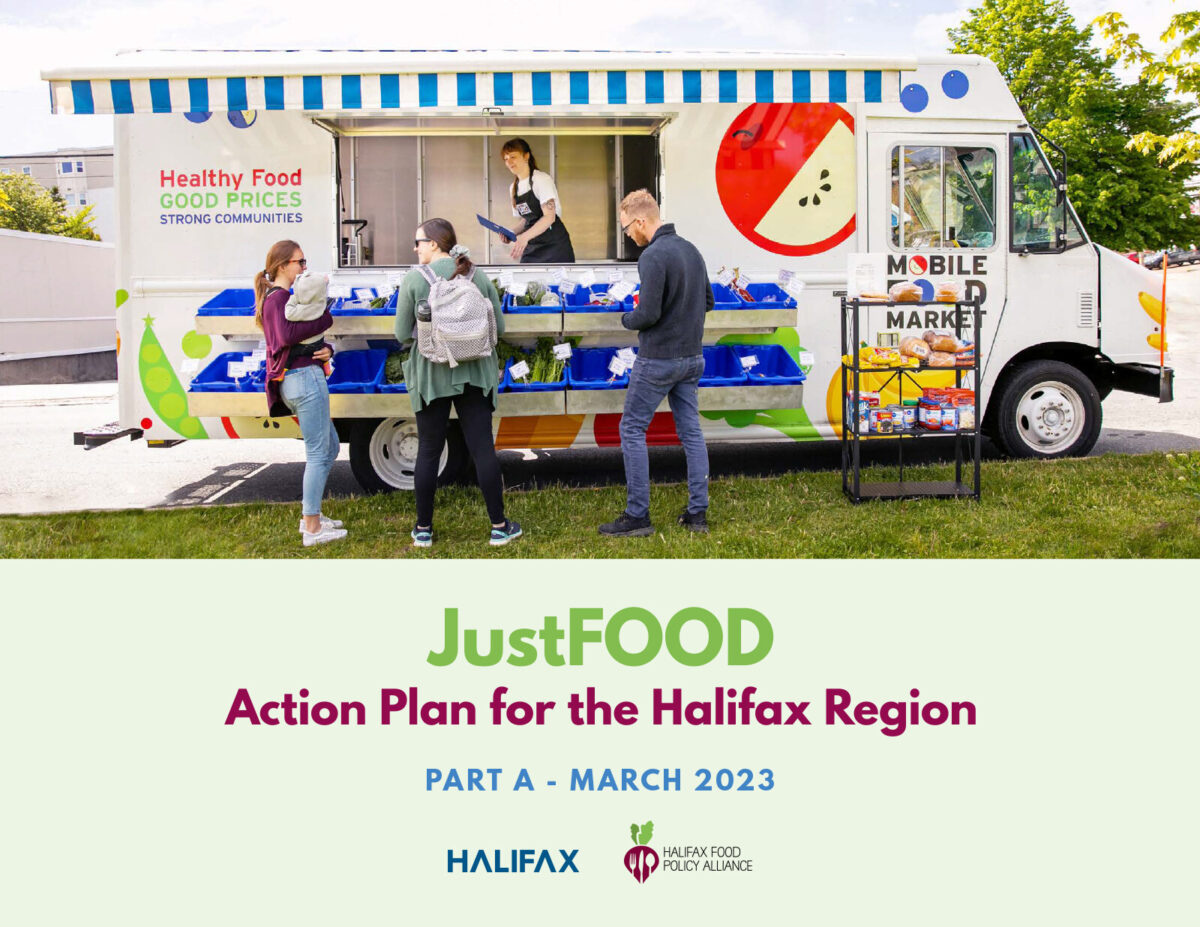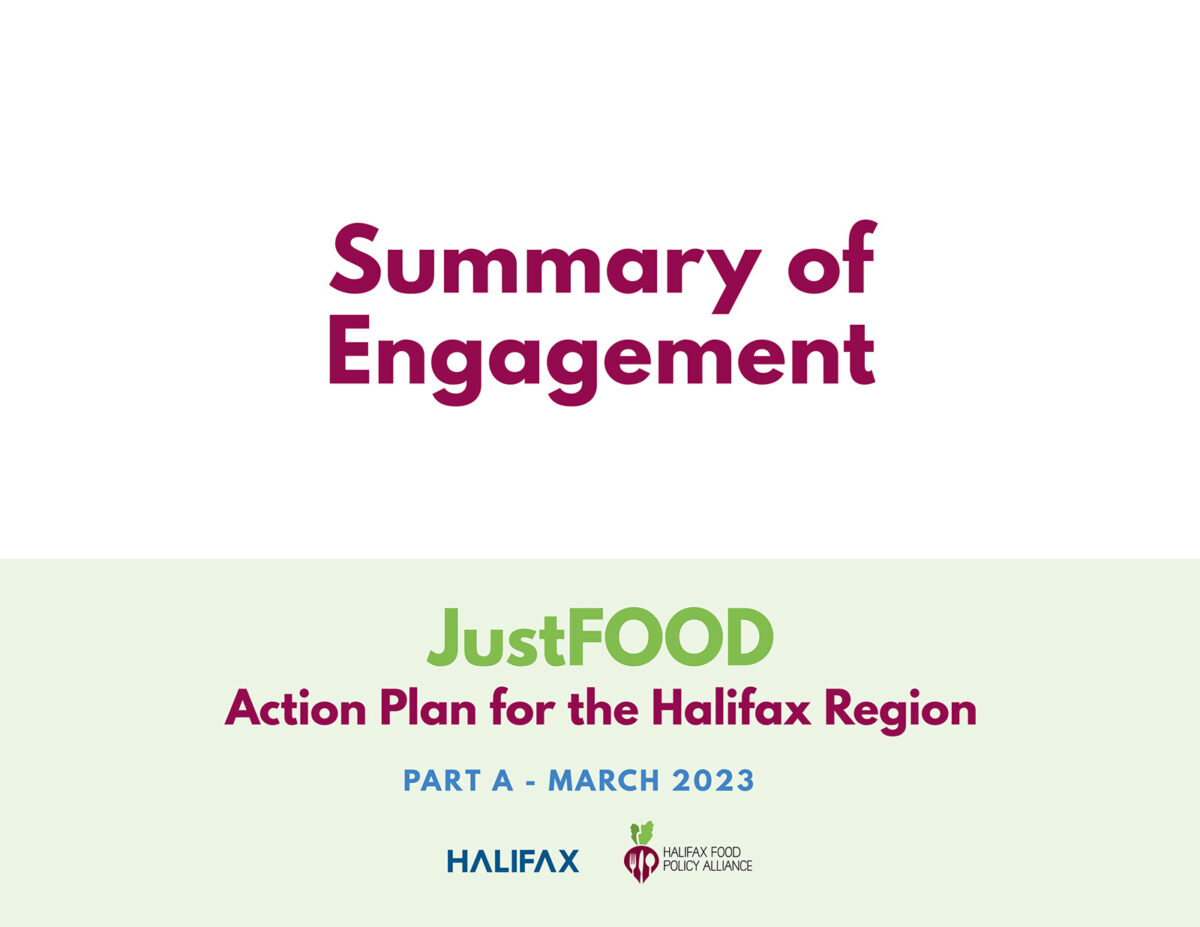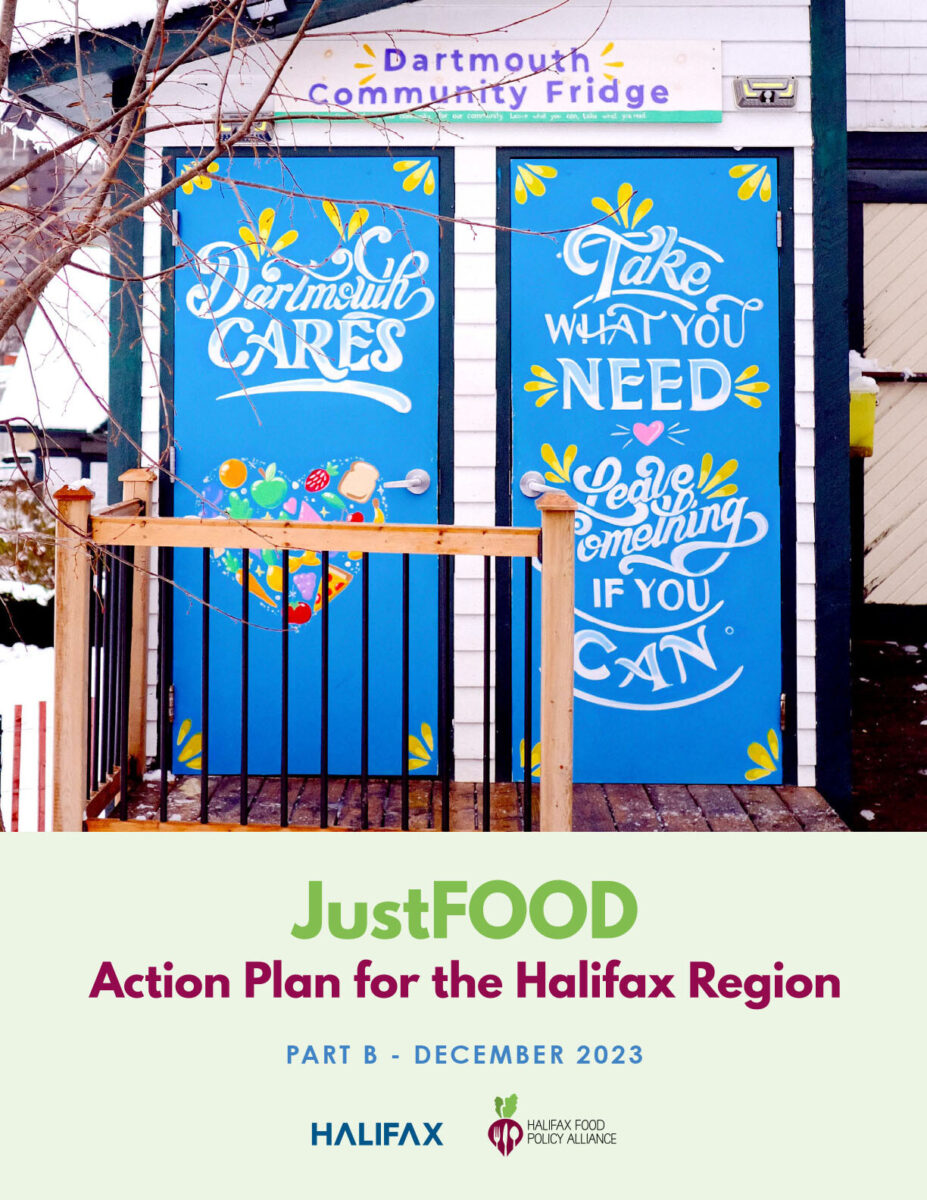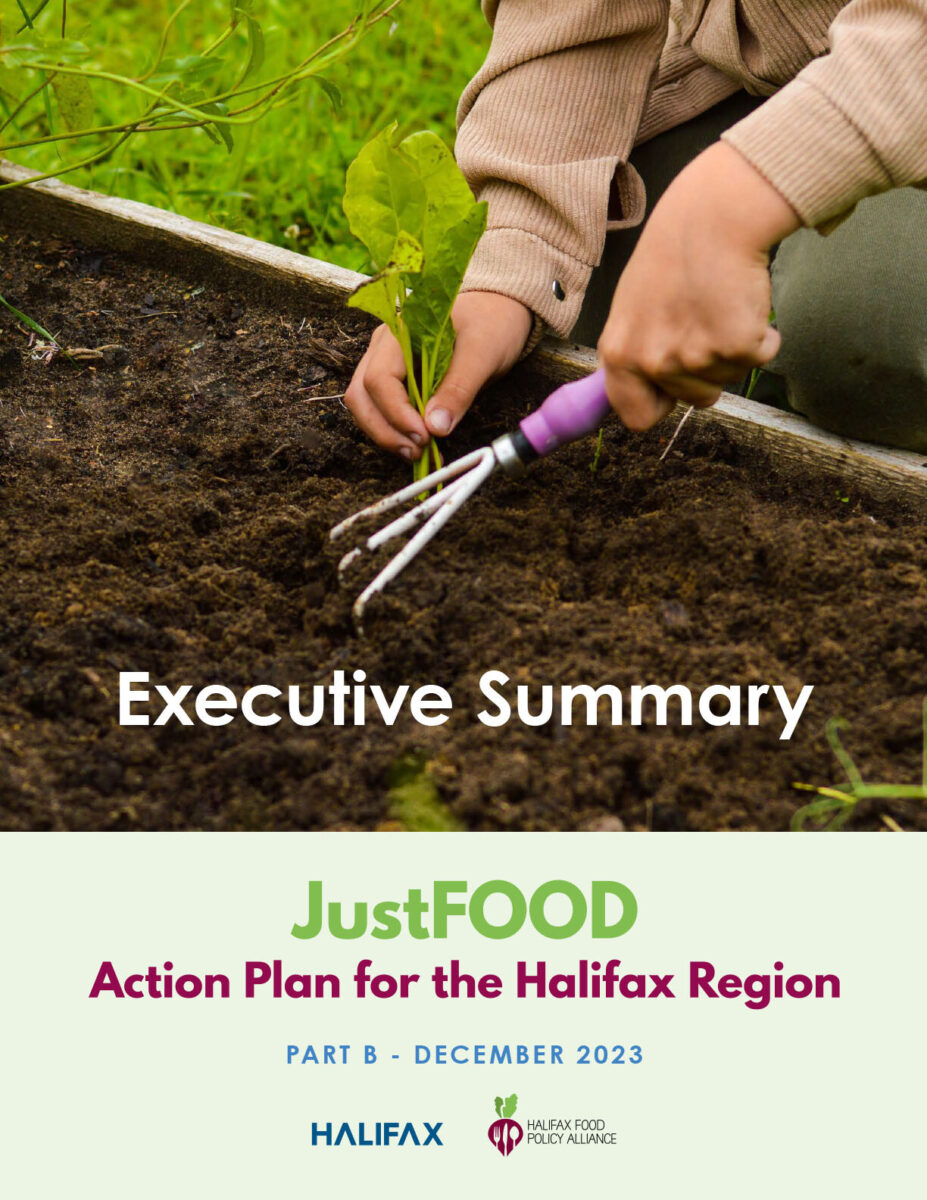On March 7th, 2023, Halifax Regional Council endorsed Part A of the JustFOOD Action Plan for the Halifax Region. Council also directed Mayor Savage to make HRM a signatory to the Milan Urban Food Policy Pact, an international protocol aimed at tackling food-related issues at the municipal level.
On February 6th, 2024, Regional Council endorsed Part B of the Plan.
What is a Food Action Plan?
A food action plan:
- Offers a coordinated set of recommendations that require collective action and collaboration between governments, communities, institutions, organizations, and businesses.
- Identifies the actions and resources needed to affect positive food systems change and proposes tools to measure progress.
- Acts as a practical tool to engage community and partners, and build connections between actors in the food system.
Part A and Part B
Part A sets the stage for our regional food system, captures public engagement findings, and provides 56 recommendations for positive food system change. Moving forward, Part A recommendations will be monitored, evaluated, and refined by community and Plan partners over time.
Part B of the Plan is a practical document that includes Implementation Strategies that will be used to advance the priority recommendations identified in Part A. Implementation Strategies outline key milestones and next steps, confirm roles of key leads and partners; establish outcomes and performance measures; and articulate resourcing and budget requirements.
Plan Principles and Structure
The JustFOOD Action Plan assigns a set of recommendations to each of the six structural principles. The aims of each principle are outlined here:
Part A of the JustFOOD Action Plan reflects years of collaborative community and partner engagement, gathered through workshops, surveys, focus groups, and meetings. Engagements were designed to ensure that community concerns and aspirations were consistently understood, considered, and directly reflected in Plan recommendations, recognizing that true expertise is found in community.
![]() Governance recommendations aim to facilitate collaboration across government agencies and departments, align policies and programs that impact the food system, establish knowledge-sharing mechanisms, and develop strategies to monitor progress.
Governance recommendations aim to facilitate collaboration across government agencies and departments, align policies and programs that impact the food system, establish knowledge-sharing mechanisms, and develop strategies to monitor progress.
![]() Social and Economic Equity recommendations aim to increase community-level food sovereignty, recognizing that significant system-level change requires a shift away from charitable models. The recommendations aim to ensure that everyone is able to produce, prepare, and access food safely and with dignity, and that food system work directly addresses racial inequities and the root causes of food insecurity.
Social and Economic Equity recommendations aim to increase community-level food sovereignty, recognizing that significant system-level change requires a shift away from charitable models. The recommendations aim to ensure that everyone is able to produce, prepare, and access food safely and with dignity, and that food system work directly addresses racial inequities and the root causes of food insecurity.
- African Nova Scotian Food Justice and Sovereignty recommendations aim to celebrate the unique and vibrant food culture of the African Nova Scotian community, support strong traditions of homesteading and agriculture, and advance African Nova Scotian and Black food sovereignty.
- Indigenous Food Justice and Sovereignty recommendations aim to enable and support Indigenous Peoples in their right to access healthy and culturally preferred foods as well as to exercise autonomy over where and how their food is produced, harvested, hunted, and fished. Indigenous food sovereignty necessitates the right to self-determination of Indigenous food systems.
![]() Food Production recommendations aim to support producer livelihoods and strengthen sustainable local food production by providing resources and services to urban and rural food producers, developing the infrastructure needed to support a local food system, enabling secure access to land for sustainable food production, and supporting short food chains.
Food Production recommendations aim to support producer livelihoods and strengthen sustainable local food production by providing resources and services to urban and rural food producers, developing the infrastructure needed to support a local food system, enabling secure access to land for sustainable food production, and supporting short food chains.
![]() Food Supply, Processing, and Distribution recommendations aim to ensure a sustainable, fair, reliable, and efficient supply and distribution of food into and within the municipality.
Food Supply, Processing, and Distribution recommendations aim to ensure a sustainable, fair, reliable, and efficient supply and distribution of food into and within the municipality.
![]() Health, Wellness, and Resilience recommendations aim to promote and support access to nutritious food and create the conditions for healthy food environments while promoting sustainable diets.These actions also aim to strengthen ecological resilience through improved air, water, and soil quality, and increased biodiversity. As climate change continues to threaten our food system, protecting the health of our environment is critical to strengthening community-level health and resilience.
Health, Wellness, and Resilience recommendations aim to promote and support access to nutritious food and create the conditions for healthy food environments while promoting sustainable diets.These actions also aim to strengthen ecological resilience through improved air, water, and soil quality, and increased biodiversity. As climate change continues to threaten our food system, protecting the health of our environment is critical to strengthening community-level health and resilience.
![]() Food Waste recommendations aim to support the municipality to sustainably manage and reduce food waste by recovering and redistributing food, raising awareness of food loss and waste, and enabling effective composting.
Food Waste recommendations aim to support the municipality to sustainably manage and reduce food waste by recovering and redistributing food, raising awareness of food loss and waste, and enabling effective composting.
